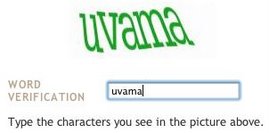Subscribe to:
Post Comments (Atom)
skip to main |
skip to sidebar

Here's the entrance to the university.

How to post comments to the course blog There are 5 steps in the process: 1. Click on "comments"--it's a line at the bottom of each posting on the blog. 2. Type your answer in the "Leave Your Comment" box. 3. Complete the word verification process (type the squiggly letters you see in the box). 4. Choose an identity. Generally, unless you already have a Blogger ID, select "Name/URL" and then type your first name (we must be able to identify you to give you credit for your posts) into the box that appears. 5. Click on "publish your comment".
This blog is for Athabasca University students in English 140:Grammar.
NEW BLOG
There is a new blog site for this blog: English Skills Blog. It has all of the old features plus a lot of new ones. Check it out!
Athabasca University

Here's the entrance to the university.
Our Visitor Globe--click on it!
Followers
STUDENT AWARDS
Check out the Student Awards web site for all the details.
Posting a Comment

How to post comments to the course blog There are 5 steps in the process: 1. Click on "comments"--it's a line at the bottom of each posting on the blog. 2. Type your answer in the "Leave Your Comment" box. 3. Complete the word verification process (type the squiggly letters you see in the box). 4. Choose an identity. Generally, unless you already have a Blogger ID, select "Name/URL" and then type your first name (we must be able to identify you to give you credit for your posts) into the box that appears. 5. Click on "publish your comment".
Online Resources
IDIOMS
If English is not your first language, then English idioms are probably difficult for you. The BBC has a site that provides interesting and crazy videos to explain a variety of idioms.
GRAMMAR GIRL!
For a humourous look at grammar and some of the stickier grammatical situations, check out Grammar Girl. There is a site called Quick and Dirty Tips, and there is also a series of podcasts available. A book on the same topic has just been published. For those of you who are on Facebook, you might like to become a fan of Grammar Girl.
Reference materials
ARE APOSTROPHES IMPORTANT?
There has been a debate in the media about the importance of apostrophes since Birmingham, a large city in England, banned apostrophes! What do you think? Read about the issues.
WHAT’S NEW IN PUNCTUATION?
Have you ever heard of the interrobang? It’s a symbol that is cross between a question mark and an exclamation mark. Check some background information about it, and listen to a CBC podcast that includes a discussion of this interesting punctuation mark. However, there is a word of warning--don’t use it in formal academic writing.
SPELLING TEST
Blog Archive
-
▼
2009
(68)
-
▼
February
(31)
- MODULE 1 AND ASSIGNMENT 1
- MODULE 2 AND ASSIGNMENT 2
- MODULE 3 AND ASSIGNMENT 3
- MODULE 4 AND ASSIGNMENT 4
- MODULE 5 AND ASSIGNMENT 5
- MODULE 6 AND ASSIGNMENT 6
- MODULE 7 AND ASSIGNMENT 7
- MODULE 8 AND ASSIGNMENT 8
- MODULE 9 AND ASSIGNMENT 9
- WHAT'S HAPPENING?
- GRAMMAR QUESTION, Feb. 24th, 2010
- PUZZLE, Feb. 24th, 2010
- ALL CHANGE! Feb. 24th, 2010
- COMPLETE THE SENTENCE ... Feb. 24th, 2010
- VOCABULARY, Feb. 24th, 2010
- THE PASSIVE, Feb. 24th, 2010
- WHAT'S HAPPENING?
- Chinese Spring Festival
- GRAMMAR QUESTION, Feb. 12th, 2010
- PUZZLE, Feb. 12th, 2010
- ALL CHANGE! Feb. 12th, 2010
- COMPLETE THE SENTENCE ... Feb. 12th, 2010
- THE PASSIVE, Feb. 12th, 2010
- EXAM PRACTICE, Feb. 12th, 2010
- GRAMMAR QUESTION, Feb. 1st, 2010
- PUZZLE, Feb. 1st, 2010
- ALL CHANGE! Feb. 1st, 2010
- COMPLETE THE SENTENCE ..., Feb. 1st, 2010
- THE PASSIVE, Feb. 1st, 2010
- VOCABULARY, Feb. 1st, 2010
- EXAM PRACTICE, Feb. 1st, 2010
-
▼
February
(31)
WIMBA
Before you access WIMBA for the first time, please send me an e-mail (veronica@athabascau.ca) indicating that you want to use this resource.
1. Access WIMBA
2. The link takes you to the WIMBA resource page—click on WIMBA.
3. Enter your e-mail address and your password (English)—then you will see the My Wimba page.
4. Click on English 140—Introduction
5. Click on Introductory Message and then the forward arrow on the toolbar. You should then hear the message.
6. To reply, click on the Reply button and the forward button, and begin to record your message.
7. For more information about using WIMBA, please return to the WIMBA resource page and click on User Guide, Sound Tips, or Technical Help.
DEFINITIONS
Clause: A clause is a group of words containing a subject and a verb.
Independent clause: A clause that can be used alone as a sentence and that does not need any other grammatical construction: e.g. He hit the ball over the fence.
Dependent clause: A clause that cannot form a separate sentence; there must be an independent clause for it to modify: e.g. When Peter played baseball, he hit the ball over the fence.
Phrase: A group of words used together to express an idea but without a subject and a verb: e.g. In the game yesterday, he hit the ball over the fence.
Independent clause: A clause that can be used alone as a sentence and that does not need any other grammatical construction: e.g. He hit the ball over the fence.
Dependent clause: A clause that cannot form a separate sentence; there must be an independent clause for it to modify: e.g. When Peter played baseball, he hit the ball over the fence.
Phrase: A group of words used together to express an idea but without a subject and a verb: e.g. In the game yesterday, he hit the ball over the fence.
CONJUNCTIONS
Coordinating Conjunctions (FANBOYS)
For And Nor But Or Yet So
Subordinating Conjunctions (WISH ABOUT)
Who, what, where, when, why, which, whether, while
If Since, so that How
As, after, although Before, because Once Unless, until
Than, that, though
For And Nor But Or Yet So
Subordinating Conjunctions (WISH ABOUT)
Who, what, where, when, why, which, whether, while
If Since, so that How
As, after, although Before, because Once Unless, until
Than, that, though
PUNCTUATION BASICS
1. When using an introductory phrase, remember to set it off with a comma.
2. If you have an introductory dependent clause, set it off with a comma.
3. Two independent clauses can be more difficult; use a semicolon to separate them if there is no coordinating conjunction, but use a comma if there is a one.
2. If you have an introductory dependent clause, set it off with a comma.
3. Two independent clauses can be more difficult; use a semicolon to separate them if there is no coordinating conjunction, but use a comma if there is a one.

8 comments:
Spelling mistakes are avoidable by using a dictionary.
ANASTASIA: A good solution:-)
Passive to Active
Joanne could have avoided making spelling mistakes if she had used a dictionary.
JOANNE: Nice work!
A dictionary could have been used to avoid spelling mistakes.
DANIEL:That's still the passive--could have been avoided.
Iam not sure but here:
Joanne hasn't used a dictionary to avoid spelling mistakes.
DANIEL: That reads more as an effect of not using a dictionary; you need to include some element of possibility here as reflected by the use of 'could', but you have used the active voice--part way there!
Post a Comment